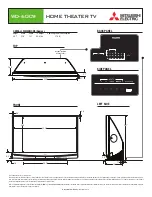
2
The references listed on Page 22 provide more
background on this subject. These documents
also contain Bibliographies for further study.
Ground Fault Protection
The following information and examples cover
three impedance levels of grounding: low,
medium, and high. A low impedance grounded
generator refers to a generator that has zero or
minimal impedance applied at the Wye neutral
point so that, during a ground fault at the genera-
tor HV terminals, ground current from the genera-
tor is approximately equal to 3 phase fault
current. A medium impedance grounded genera-
tor refers to a generator that has substantial im-
pedance applied at the wye neutral point so that,
during a ground fault, a reduced but readily de-
tectable level of ground current, typically on the
order of 100-500A, flows. A high impedance
grounded generator refers to a generator with a
large grounding impedance so that, during a
ground fault, a nearly undetectable level of fault
current flows, necessitating ground fault monitor-
ing with voltage based (e.g., 3rd harmonic volt-
age monitoring and fundamental frequency neu-
tral voltage shift monitoring) relays. The location
of the grounding, generator neutral(s) or trans-
former, also influences the protection approach.
The location of the ground fault within the gen-
erator winding, as well as the grounding imped-
ance, determines the level of fault current.
Assuming that the generated voltage along each
segment of the winding is uniform, the prefault
line-ground voltage level is proportional to the
percent of winding between the fault location and
the generator neutral, V
FG
in Fig. 1. Assuming an
impedance grounded generator where (Z
0, SOURCE
and Z
N
)>>Z
WINDING
, the current level is directly
proportional to the distance of the point from the
generator neutral [Fig. 1(a)], so a fault 10% from
neutral produces 10% of the current that flows
for a fault on the generator terminals. While the
current level drops towards zero as the neutral is
approached, the insulation stress also drops,
tending to reduce the probability of a fault near
the neutral. If a generator grounding impedance
is low relative to the generator winding imped-
ance or the system ground impedance is low, the
fault current decay will be non-linear. For
I
1
in
Fig. 1, lower fault voltage is offset by lower
generator winding resistance. An example is
shown in Fig. 1(b).
The generator differential relay (87G) may be
sensitive enough to detect winding ground faults
with low-impedance grounding per Fig. 2. This
would be the case if a solid generator-terminal
fault produces approximately 100% of rated
current. The minimum pickup setting of the
differential relays (e.g., Basler BE1-CDS220 or
BE1-87G, Table 2) should be adjusted to sense
faults on as much of the winding as possible.
However, settings below 10% of full load current
(e.g., 0.4A for 4A full load current) carry in-
creased risk of misoperation due to transient CT
saturation during external faults or during step-up
transformer energization. Lower pickup settings
are recommended only with high-quality CTs
(e.g., C400) and a good CT match (e.g., identical
accuracy class and equal burden).
FIGURE 1. EFFECTS OF FAULT LOCATION WITHIN
GENERATOR ON CURRENT LEVEL.
If 87G relaying is provided per Fig. 2, relay 51N
(e.g., Basler relays per Table 2) backs up the
87G, as well as external relays. If an 87G is not
provided or is not sufficiently sensitive for ground





































